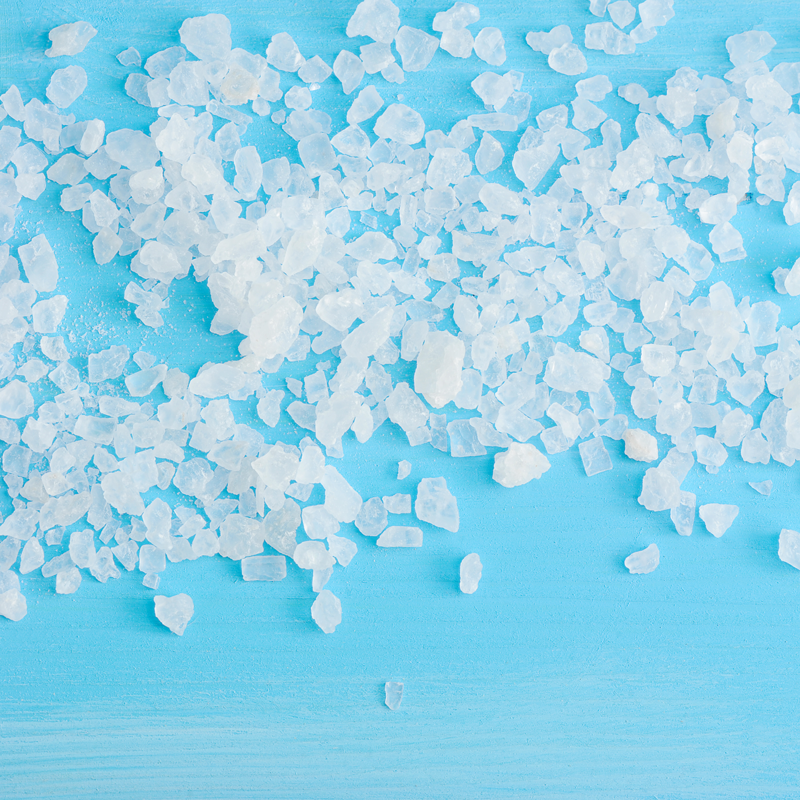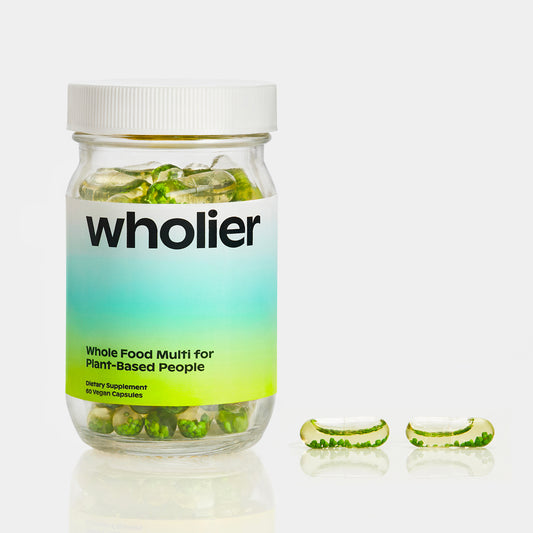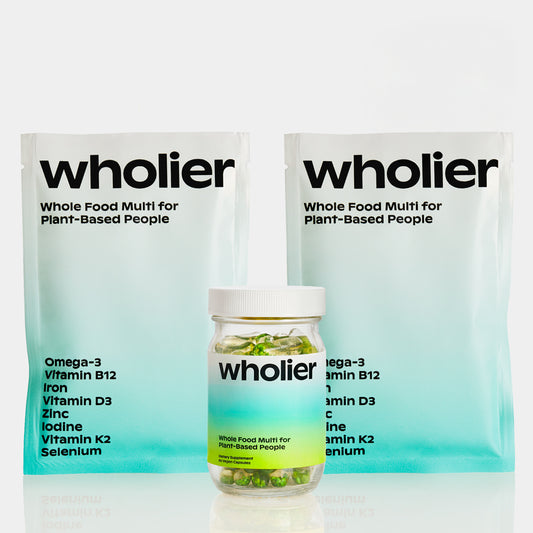
Vegan Sources of Iodine: What You Need to Know
Find out about the importance of iodine in a vegan diet, vegan sources of iodine, and whether or not vegans should consider taking an iodine supplement.
As more people adopt a vegan lifestyle, it's important to consider whether their diet is providing all the necessary nutrients for optimal health. One nutrient that may be lacking in a vegan diet is iodine. In this article, we'll explore the importance of iodine, vegan sources of iodine, and whether vegans should consider taking an iodine supplement.
What is Iodine?
Iodine is a mineral that is essential for thyroid function and overall health. It plays a key role in the production of thyroid hormones, which regulate metabolism, growth, and development (1). While iodine is naturally found in many foods, there are fewer sources of iodine in vegan food, making it challenging for vegans to obtain enough of this essential nutrient.
Why Is Iodine Important?
Iodine is essential for the production of thyroid hormones, which regulate metabolism, growth, and development (1). When the body does not get enough iodine, it can lead to an enlarged thyroid gland (goiter), hypothyroidism, and even mental impairment in severe cases (2).
Pregnant women are especially at risk of iodine deficiency, as iodine is critical for fetal brain development (3). A deficiency of iodine during pregnancy can lead to developmental delays, mental impairment, and even stillbirth (4).
Vegan Sources of Iodine
There are fewer sources of iodine in vegan food than in animal products, making it challenging for vegans to obtain enough of this essential nutrient. However, there are still some vegan sources of iodine that can help vegans meet their recommended intake.
Seaweed
Seaweed is one of the richest sources of iodine, with some varieties containing up to 45,000 mcg of iodine per gram (5). Nori, dulse, kelp, and wakame are all types of seaweed that are commonly consumed in vegan diets. However, it's important to note that the iodine content of seaweed can vary widely based on the type of seaweed and where it was grown (6).
Iodized Salt
Iodized salt is table salt that has been fortified with iodine. It's a convenient and inexpensive way to obtain iodine, with just 1/4 teaspoon of iodized salt containing approximately 95 mcg of iodine (7). However, it's important to note that excessive salt intake can lead to high blood pressure and other health problems, so it's important to use iodized salt in moderation.
Other Vegan Sources of Iodine
Some other vegan sources of iodine include:
- Lima beans (1 cup cooked): 16 mcg of iodine (8)
- Navy beans (1 cup cooked): 64 mcg of iodine (8)
- Prunes (5 prunes): 13 mcg of iodine (8)
Should Vegans Consider Taking an Iodine Supplement?
Due to the limited sources of iodine in a vegan diet, many vegans should consider taking an iodine supplement to ensure they're getting enough of this essential nutrient. The recommended daily intake of iodine for adults is 150 mcg (9).
However, it's important to note that excessive iodine intake can also be harmful. Too much iodine can lead to hyperthyroidism and other health problems (10). Therefore, it's important to consult with a healthcare professional before starting any new supplement regimen.
Clinical Studies on Iodine and Vegan Diets
Several clinical studies have investigated the iodine status of vegans and vegetarians. A study published in the Journal of Clinical Endocrinology and Metabolism found that vegans had lower urinary iodine concentrations compared to omnivores and vegetarians (11). Another study published in the European Journal of Clinical Nutrition found that
vegans had lower iodine intakes than omnivores and lacto-ovo vegetarians (12). A systematic review published in Nutrients found that iodine deficiency is a common problem among vegans and vegetarians, and that iodine supplementation may be necessary to prevent deficiency (13).
Iodine is an essential nutrient that plays a critical role in thyroid function and overall health. While there are fewer sources of iodine in vegan food than in animal products, there are still some vegan sources of iodine, including seaweed, iodized salt, and certain plant-based foods. However, many vegans should consider taking an iodine supplement to ensure they're getting enough of this essential nutrient. As always, it's important to consult with a healthcare professional before starting any new supplement regimen.
Sources:
(1) Zimmermann MB. Iodine deficiency. Endocr Rev. 2009;30(4):376-408.
(2) Leung AM, Braverman LE. Consequences of excess iodine. Nat Rev Endocrinol. 2014;10(3):136-142.
(3) Bath SC, Steer CD, Golding J, Emmett P, Rayman MP. Effect of inadequate iodine status in UK pregnant women on cognitive outcomes in their children: results from the Avon Longitudinal Study of Parents and Children (ALSPAC). Lancet. 2013;382(9889):331-337.
(4) Delange F. Iodine requirements during pregnancy, lactation and the neonatal period and indicators of optimal iodine nutrition. Public Health Nutr. 2007;10(12A):1571-1580.
(5) Teas J, Pino S, Critchley A, Braverman LE. Variability of iodine content in common commercially available edible seaweeds. Thyroid. 2004;14(10):836-841.
(6) Shimizu M, Fukutomi Y, Ninomiya K, et al. Iodine content of seaweeds in Japan. Jpn J Nutr. 1998;56(4):223-231.
(7) National Institutes of Health. Iodine. Available at: https://ods.od.nih.gov/factsheets/Iodine-HealthProfessional/. Accessed March 30, 2023.
(8) USDA FoodData Central. Available at: https://fdc.nal.usda.gov/. Accessed March 30, 2023.
(9) World Health Organization. Iodine. Available at: https://www.who.int/nutrition/publications/micronutrients/iodine_in_nutrition/en/. Accessed March 30, 2023.
(10) Leung AM, Pearce EN, Braverman LE. Iodine nutrition in pregnancy and lactation. Endocrinol Metab Clin North Am. 2011;40(4):765-777.
(11) Krajcovicová-Kudlácková M, Bucková K, Klimes I, Seboková E. Iodine deficiency in vegetarians and vegans. Ann Nutr Metab. 2003;47(5):183-185.
(12) König F, Andersson M, Hotz K, Aeberli I, Zimmermann MB. Ten repeat collections for urinary iodine from spot samples or 24-hour samples are needed to reliably estimate individual iodine status in women. J Nutr. 2011;141(11):2049-2054.
(13) Pearce EN, Caldwell KL. Urinary iodine, thyroid function, and thyroglobulin as biomarkers of iodine status.





